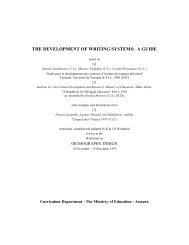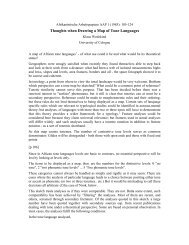Relevance in conversations in Busa (Nigeria ... - Klaus Wedekind
Relevance in conversations in Busa (Nigeria ... - Klaus Wedekind
Relevance in conversations in Busa (Nigeria ... - Klaus Wedekind
You also want an ePaper? Increase the reach of your titles
YUMPU automatically turns print PDFs into web optimized ePapers that Google loves.
Consider the follow<strong>in</strong>g two <strong>conversations</strong>, both of which took place <strong>in</strong> the same sett<strong>in</strong>g <strong>in</strong> a littlevillage near Kaiama, <strong>Nigeria</strong>. 3 The speaker <strong>in</strong>troduced as A is one of the village elders, B is me,the L2 speaker of <strong>Busa</strong>.Conversation 1. 4 Time: an even<strong>in</strong>g <strong>in</strong> 1969. Topic: events and activities of the day, andimplicitly: practical ethics.A1: And you, what have you been do<strong>in</strong>g?B1: I have been writ<strong>in</strong>g.A2: (acknowledges)B2: Writ<strong>in</strong>g proverbs.A3: (acknow ledges)B3: Let me tell you one. 5(1)blo 1 ke 1 di 1 re 2 ii 3 mu 1 su 3toad which climbed tree on-topA toad which has got to the top of a treegban 1 -n 1 -loh 2bird-it:is-not.isn't a bird yet.The conversation then cont<strong>in</strong>ued and enlarged on the topic of presumptuous and <strong>in</strong>appropriatebehavior for a while. In retrospect, I consider this conversation a felicitous piece ofcommunication. One reason for this is that Wilhelm Busch's wise say<strong>in</strong>g was, so to say, accepted<strong>in</strong>to the genre of <strong>Busa</strong> proverb..s. This <strong>in</strong> itself was pleasant to observe, whether Aesop hadprepared the way or not. <strong>Busa</strong> proverbs can be illustrated by the follow<strong>in</strong>g two-l<strong>in</strong>ers both ofwhich are not very different from tbat of Busch:(2)to 3 ban 1 zi 1 kun 1 bi 3 ta 3 ,if a:bird age held much,Even if a bird may have got very old,e l -e 3 li 3 kun 3 -ro 2 .it-FUTURE tree hold-not.it won't remove trees. (Wedek<strong>in</strong>d 1970b; 1972: 100)
(3)bo 3 -n 3 ti 1 i 3 da 2 ,what?- is a:rob<strong>in</strong> mother,How small the mother rob<strong>in</strong> is,be 1 re 3 a 1 ne 3 !even her child!and how much smaller her child! (Wedek<strong>in</strong>d 1970b; 1972: 102)The second reason why this conversation was satisfy<strong>in</strong>g is because the subsequent contributionsenlarged on the subject <strong>in</strong> a mean<strong>in</strong>gful, coherent way and this not just for politeness' sake, butunder the rhetorical pr<strong>in</strong>ciple of 'relevance'. 6 Now compare this with the second conversation.Conversation 2. Time: an even<strong>in</strong>g <strong>in</strong> 1969. General topic: events of the day.A1: (Short silence)B1: A man has been walk<strong>in</strong>g on the moon now.(There follows a short explanation that he flew there)A2: (Silence. Then, as the silence beg<strong>in</strong>s to get awkward:)A3: Is there good soil for farm<strong>in</strong>g up there?B3: No.A4: (Silence. Change of subject)B4: (Perplexed)Today, we might get a reaction like A3 from 'progressive' Western conversation partners, but thiswas <strong>in</strong> 1969, and it was <strong>in</strong> the quiet <strong>Busa</strong> culture of the <strong>Nigeria</strong>n countryside. While the firstconversation can be considered felicitous, this second one was a failure. But why did it fail?There are several explanations I have to offer.1. My limited L2 competence. (Possible, but my conversation partners did not give up on me <strong>in</strong>other <strong>conversations</strong>.)2. Disbelief. The men thought I was ly<strong>in</strong>g. (Not impossible, but, as far as I remember, this wouldbe the only <strong>in</strong>stance of such a reaction, and not consistent with the reply given, A3 above.)3. Religious <strong>in</strong>dignation. My conversation partner was a Muslim who did not like to see the moontreated irreverently. (Possible, but not typical of <strong>Busa</strong> religious behavior, and not consistent withreply A3.)4. Irrelevance. If the topic 'moon' did not relate to mean<strong>in</strong>gful <strong>Busa</strong> values or concepts andpropositions such as the lunar and religious calendar or the need for good farm<strong>in</strong>g land close athand, then the topic was for the foreigner alone, and it had no place <strong>in</strong> the <strong>Busa</strong> world ofdiscourse.
ReferencesBusch, Wilhelm1974 F<strong>in</strong>k und Frosch. In Bohne, Friedrich (ed.), Gedichte (Studien Ausgabe 1). Zurich:Diogenes. (Orig<strong>in</strong>ally published <strong>in</strong> 1908.)Grice, H.P.1975 Logic and conversation. In Cole, P. and J. Morgan (eds.), Syntax and Semantics 3:Speech Acts. New York: Academic Press, 41-58.Leech, Geoffrey1983 Pr<strong>in</strong>ciples of Pragmatics. New York and London: Longman.Smith, Neil and Deirdre Wilson1979 Modern L<strong>in</strong>guistics. Harmondsworth: Pengu<strong>in</strong>.Wedek<strong>in</strong>d, <strong>Klaus</strong>1970a Read and write busanci: Karatu da Rubutun <strong>Busa</strong>nchi, Zaria. (Mimeograph.)- 1970b <strong>Busa</strong> Morpheme Concordance (based on a collection of <strong>Busa</strong> texts) Oklahoma:University of Oklahoma.- 1972 An outl<strong>in</strong>e of the grammar of <strong>Busa</strong> (<strong>Nigeria</strong>). Unpublished Ph.D. dissertation,Kiel: University of Kiel.Wilson, Deirdre and Dan SperberFortcom<strong>in</strong>g. Inference and implicature <strong>in</strong> utterance <strong>in</strong>terpretation. In Travis, C. (ed.),Inference and Implicature. Oxford: Blackwell.1 The <strong>Busa</strong> people near the Ben<strong>in</strong> border number around 50,000. They are the only people as far east as Ben<strong>in</strong> and<strong>Nigeria</strong> speak<strong>in</strong>g a Mantle language. The events described here occurred dur<strong>in</strong>g field studies <strong>in</strong> 1969. For details seenote 2 below and Wedek<strong>in</strong>d (1972).2 'Relevant' is understood as 'contribut<strong>in</strong>g to the conversational goal' of speaker and hearer (Leech 1980: 94,redef<strong>in</strong><strong>in</strong>g 'relevance' as def<strong>in</strong>ed <strong>in</strong> Smith and Wilson 1979: 177).3 For a little more than two years my family and I lived <strong>in</strong> Gbangiz<strong>in</strong>, a t<strong>in</strong>y village north of Kaiama.4 The transcription is phonemic/orthographic (see Wedek<strong>in</strong>d 1970a, 1972: 221-263). CVn marks nasalization, -hmarks the closed set <strong>in</strong> a vowel harmony, and for practical reasons, tones here are given as numbers: Low CV 1 , MidCV 2 , and High CV 3 .5 <strong>Busa</strong> proverbs (ga 1 ra 3 ) take the form of two l<strong>in</strong>es, and the Wilhelm Busch translation was easily acceptable with<strong>in</strong>this framework.6 Grice (1975) speaks of a 'politeness pr<strong>in</strong>ciple' <strong>in</strong> <strong>in</strong>terpersonal rhetoric, as different from the effort to be 'relevant'.7 Also, see Wilson and Sperber (forthcom<strong>in</strong>g: 21) 'the greater the amount of process<strong>in</strong>g, it [ie., a new proposition]requires, the less relevant it is'.












